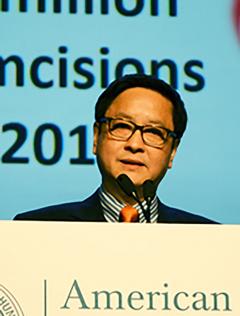Approximately 5,500 new HIV infections are reported globally every day, with nearly two-thirds of those cases occurring in sub-Saharan Africa.
The results of three large randomized controlled trials conducted in Africa suggest that male circumcision could reduce the risk of HIV infection by up to 60 percent, according to Philip Li, MD, associate research professor of Urology and Reproductive Medicine, and Director of the Male Infertility Microsurgical Research and Training Program at Weill Cornell Medical College.
“Additional benefits of male circumcision include reduction of urinary tract infections and sexually transmitted diseases, such as HPV and HSV type 2, which cause genital ulcers associated with increased risk of HIV acquisition,” Dr. Li said. “Given this compelling data, the World Health Organization [WHO] recommends circumcision in 14 sub-Saharan African countries that have low circumcision rates and high HIV incidence as part of their national HIV prevention strategies.”
In 2011, the WHO set a goal of performing 20.8 million circumcisions in those 14 sub-Saharan African countries by 2016. About half of that goal has been achieved to date despite increasing efforts.
“The major obstacles for scaling up male circumcision are the shortage of well trained surgeons and physicians in Africa, and the challenges of implementing safe and effective male circumcision devices,” Dr. Li said.
The answer to these challenges may be the ShangRing circumcision device, one of two FDA approved and WHO pre-qualified male circumcision devices. Invented in China, it has been safely used in more than 1 million men worldwide since 2006, Dr. Li reported. The ShangRing device is adjustable and can be used on patients of all ages. Experienced medical providers using the device can complete a procedure in about five minutes.
With support from the Bill and Melinda Gates Foundation, the WHO and the National Institutes of Health, Dr. Li said investigators have completed five well designed randomized controlled trials and clinical studies in three African countries demonstrating that the ShangRing procedure is simple, safe, effective and well received.
“We reported 97 percent patient and provider satisfaction and we found no serious complications in any of our five studies,” Dr. Li said. “WHO reviewed our ShangRing clinical data and evaluated efficacy, safety and accessibility. They concluded that ShangRing is safe and effective in over 99 percent of patients, with no serious complications found in almost 2,000 patients.”
Based on these findings, Dr. Li believes that the ShangRing device could be a valuable tool in shifting the task of performing male circumcisions from physicians to non-physician providers, while also attracting more men to seek circumcision.
“ShangRing is a true symbol of global collaboration and could be a game changer in scaling up male circumcision globally,” Dr. Li said. “Male circumcision saves lives, and by scaling up male circumcision globally we may one day achieve an AIDS-free generation.”
- Presentation


